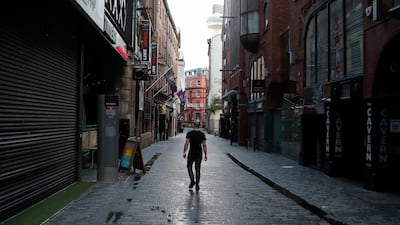Boris Johnson has plunged England into another national lockdown to avert a “medical and moral disaster” caused by rapidly rising coronavirus cases.
People have been ordered to stay at home unless there is a specific reason to leave.
However, the key difference from the spring lockdown is that schools and universities will remain open.
When do the rules come into force?
The national lockdown runs from midnight on November 4 until December 2.
England will then return to its tiered restrictions - where areas fall under medium, high or very high alert levels based on the infection rate.
Police have the power to issue fines and break up gatherings.
Are people allowed to leave home?
People are told to stay at home unless they have a specific reason to be outside.
Those reasons include work if you cannot work from home, education if it is not provided online and exercise.
People can also leave the house if they are carrying out “essential activities” such as visiting the supermarket or attending a medical appointment.
Support bubbles, where a household with one adult joins another household, remain in place.
People buying or renting a property may also leave their home.
What about meeting others?
In general, people must not meet socially.
However, the government says people can exercise or meet in a public outdoors space with people in their household or support bubble.
Individuals are also allowed to meet with one other person not from their household or in their support bubble outdoors.
People are not allowed to meet in a private garden unless they live with them or they are from their support bubble.
Workplaces, support groups, childcare centres and funerals are all allowed to host larger groups of people.
What businesses will close?
Non-essential shops, leisure and entertainment venues will all be closed.
Retail outlets, hairdressers and beauty salons will all not be welcoming customers.
And gyms, swimming pools and dance studios are among the sporting and leisure centres to shut their doors.
Restaurants, cafes and pubs will close unless operating a takeaway service.
Hotels, hostels and other accommodation should only be open for those who have to travel for work, or other reasons such as providing beds for the homeless.
What will stay open?
All essential shops such as supermarkets, pharmacies and other food outlets will remain open.
The NHS and medical services such as GPs, along with job centres and courts, will stay open.
Schools, colleges and universities will all remain open.
However, students living away from home will not be able to return home during term time but can go back for Christmas.
Are people still allowed to travel?
People are not allowed to travel overseas or within the UK unless for work, education or other legally permissible reasons.
Other exemptions include caring responsibilities, visiting those in your support bubble or exercise.
People are encouraged to avoid public transport.
Why is only England going into lockdown?
Scotland, Wales and Northern Ireland have introduced individual measures for their own countries.
The “firebreak” lockdown in Wales will end on November 9, while Scotland is sticking with its five-tier restrictions for now.
Northern Ireland’s enhanced restrictions are due to end on November 13.
What is different to the spring lockdown?
Boris Johnson has said England’s second lockdown will be less severe than the shutdown imposed in spring.
This time, schools and universities will remain open, while people will be allowed out for exercise more than once a day.
Televised sport including the Premier League will continue to play without crowds.











